Debra Brown's Blog, page 8
May 15, 2013
Historical Fiction Enticements 5/15
The Winchester Goose: at the court of Henry VIII
Judith Arnopp
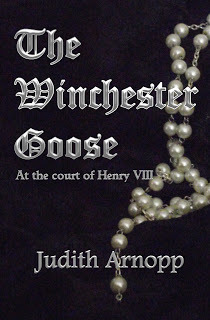
Tudor London: 1540. Each night, after dark, men flock to Bankside seeking girls of easy virtue; prostitutes known as The Winchester Geese. Joanie Toogood has worked the streets of Southwark since childhood but her path is changed forever by an encounter with Francis Wareham, a spy for the King’s secretary, Thomas Cromwell.
Meanwhile, across the River, at the glittering court of Henry VIII, Wareham also sets his cap at Evelyn and Isabella Bourne, members of the Queen’s household, drawing the girls into intrigue and the shadow of the executioner’s blade.
Set against the turmoil of Henry VIII’s middle years, The Winchester Goose provides a brand new perspective of the happenings at the royal court, offering a frank and often uncomfortable observation of life at both ends of the social spectrum.
Amazon US
Amazon UK
~~~~~~~~~~~~~
On a Foreign Field
Hazel West
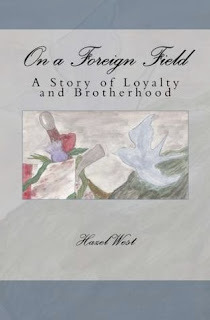
Sir Reeve Montgomery is an Englishman born and bred, proud of his heritage and the right to serve his country fighting against the Scottish rebels. But when the tide is turned unexpectedly during the Battle of Stirling Bridge, he is wounded by an English arrow, left for dead by his comrades who he always thought of as brothers, and is taken captive by William Wallace's army. Wounded, and alone on a foreign field, he knows he should expect nothing but torture and death at the hands of the Scottish rebels who are known to be complete savages.
At first, he is bitter, angry at his betrayal, and wanting revenge. He plans to escape as soon as his wounds heal, and hopes to take Wallace’s head back to England with him.
However, as he comes to know this tight brotherhood better, and sees Wallace's utter devotion to his men and the cause of freedom, he is surprised to find that his feelings are conflicted. He had been taught in his training as a knight that the Scottish were barbarians and had no honor on the battlefield. But seeing Wallace care for his men, coupled with his own interventions on Reeve’s behalf, causes the Englishman to wonder whether the English are right to oppress them at all, and even more dangerously, whether he could ever fight against the Scots again.
Faced with these troubling thoughts, Reeve must decide whether he will stay true to his king and the country of his birth, or join Wallace’s brotherhood of freedom fighters, thus turning his back on everything he has ever known or believed in and committing treason, a crime punishable by a horrid form of execution. But there are other factors to consider as well, including his budding comradeship with the men and something else entirely concerning the beautiful Maggie Armstrong.
On a Foreign Field is a heartfelt, thought-provoking read for teens and adults alike, focusing on the reality of war, and the friendship, love, and loyalty that can be formed among people fighting for the same thing.
Amazon US
Amazon UK
Smashwords
~~~~~~~~~~~~~
The Companion of Lady Holmeshire
Debra Brown
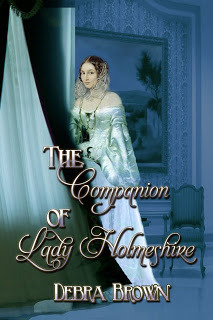
Returning by carriage from London to a cold Northumberland castle where she had once scrubbed the floors, Emma Carrington knew that life would be different—and difficult at that. Though there would be none of the previous chores, she would accompany her mistress, the sweet and unconventional Countess of Holmeshire, to dinners and tea, reproached for her status by many. But Her Ladyship would insist.
Emma adored Wills, Her Ladyship’s son, the young Earl of Holmeshire, though he was engaged by arrangement to Lady Genevieve, who was, of course, suitable. His warmth toward the former housemaid Emma and irritation with his fiancé were unmistakable. But conventions would be honored. When The Season began, they would find themselves in London following society’s rules.
Who was the old, tattered man following Emma about the village? It frightened her! And Emma wondered—what were the secrets her mistress hid?
Emma hoped to beg off from dinner with Genevieve’s family, but it was not to be. She must endure the glare of the Marquess of Breighton and the condescension of his insecure wife. Curry was served, a nod to their love of India. Genevieve despised the Indian décor and especially the Holmeshire mud and moors in favor of balls and the lights of London. “At least,” she said, “when I am mistress of Holmeshire Hall it will be kittens and rococo for me.” Wills had spent thousands on Italian marble and art. The rococo would go to the London house Genny would have as a settlement.
Who were the well-dressed men following Genny in Town? It frightened her. Something, at last, united Genevieve and Wills. No hope existed for Emma. Or did it?
Wills rose quickly in Parliament as the future son-in-law of the marquess. The peers respected his opposition to the workhouses and his philanthropic efforts—until everything fell apart.
What might the force of Lady Holmeshire’s secrets reveal? And just who is this story really about?
Amazon US Amazon UK
Barnes and Noble
iTunes
~~~~~~~~~~~~~
Cossacks in Paris
Jeffrey Perren
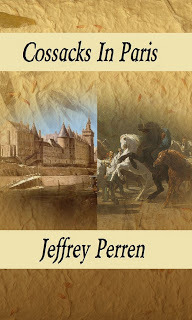
How far will one man go for love and freedom?
Rebellious Breutier Armande, a rising young civil engineer in Paris, is drafted into the Grande Armeé on the eve of Napoleon's 1812 Russian campaign.
On a scouting mission in St. Petersburg he meets Kaarina, a Finnish mathematician and daughter of the counselor to Tsar Alexander I. The pair soon fall in love — but Kaarina is betrothed to Agripin, a vicious Cossack and a favorite of the Tsar. When she refuses him, Agripin kidnaps her, aided by Kaarina's envious twin sister, Kaisa.
During Europe's brief, uneasy truce Breutier deserts Napoleon's army and the Tsar's employ to reclaim Kaarina. Dodging the vengeance of the world's most powerful rulers sends him on a perilous quest to hunt down the era's most ruthless Cossack.
Interweaving the characters' personal dramas with the epochal events of the following two years forms the core of the story. Historically accurate, the novel climaxes at the moment when, for the first time in 400 years, foreign armies invaded France, leaving behind Cossacks in Paris.
Amazon US
Amazon UK
Smashwords
CreateSpace
~~~~~~~~~~~~~
Have No Shame
Melissa Foster

When civil rights and forbidden love collide
This book will resonate with readers who enjoyed Kathryn Stockett's, The Help, Julie Kibler's, Calling Me Home, John Grisham's, A Time to Kill, Sue Monk Kidd's, The Secret Life of Bees, and Kathleen Grissom's, The Kitchen House.
"Within moments of starting to read, you will be transported back to the Arkansas of 1967 - hot, dusty, utterly rural and edgy. Poor white farmers dependent upon cheap black labor who, due to their superior numbers, are constantly suppressed, living on the wrong side of town, ghettoised and terrified. You will remember scenes from `In the Heat of the Night' and `Easy Rider'; you will remember that, less than fifty years ago, if you were black, you could be beaten for simply being in the wrong place at the wrong time. And if you died at the hands of a white youth, justice would almost certainly be denied you." Author Roderick Craig Low
SUMMARY
Alison Tillman has called Forrest Town, Arkansas home for the past eighteen years. Her mother's Blue Bonnet meetings, her father toiling night and day on the family farm, and the division of life between the whites and the blacks are all Alison knows. The winter of 1967, just a few months before marrying her high school sweetheart, Alison finds the body of a black man floating in the river, and she begins to view her existence with new perspective. The oppression and hate of the south, the ugliness she once was able to avert her eyes from, now demands her attention.
When a secretive friendship with a young black man takes an unexpected romantic turn, Alison is forced to choose between her predetermined future, and the dangerous path that her heart yearns for.
"A gripping and poignant novel dealing with a subject once taboo in American society." Hagerstown Magazine
"Have No Shame is a powerful testimony to love and the progressive, logical evolution of social consciousness, with an outcome that readers will find engrossing, unexpected, and ultimately eye-opening." Midwest Book Review
Amazon US
Amazon UK
Come back next Wednesday for five more synopsis. You may find your favorite-ever book!
Thank you for reading my blog! I am always eager to hear back from you.
Debbie Brown
Author of The Companion of Lady Holmeshire
Judith Arnopp

Tudor London: 1540. Each night, after dark, men flock to Bankside seeking girls of easy virtue; prostitutes known as The Winchester Geese. Joanie Toogood has worked the streets of Southwark since childhood but her path is changed forever by an encounter with Francis Wareham, a spy for the King’s secretary, Thomas Cromwell.
Meanwhile, across the River, at the glittering court of Henry VIII, Wareham also sets his cap at Evelyn and Isabella Bourne, members of the Queen’s household, drawing the girls into intrigue and the shadow of the executioner’s blade.
Set against the turmoil of Henry VIII’s middle years, The Winchester Goose provides a brand new perspective of the happenings at the royal court, offering a frank and often uncomfortable observation of life at both ends of the social spectrum.
Amazon US
Amazon UK
~~~~~~~~~~~~~
On a Foreign Field
Hazel West

Sir Reeve Montgomery is an Englishman born and bred, proud of his heritage and the right to serve his country fighting against the Scottish rebels. But when the tide is turned unexpectedly during the Battle of Stirling Bridge, he is wounded by an English arrow, left for dead by his comrades who he always thought of as brothers, and is taken captive by William Wallace's army. Wounded, and alone on a foreign field, he knows he should expect nothing but torture and death at the hands of the Scottish rebels who are known to be complete savages.
At first, he is bitter, angry at his betrayal, and wanting revenge. He plans to escape as soon as his wounds heal, and hopes to take Wallace’s head back to England with him.
However, as he comes to know this tight brotherhood better, and sees Wallace's utter devotion to his men and the cause of freedom, he is surprised to find that his feelings are conflicted. He had been taught in his training as a knight that the Scottish were barbarians and had no honor on the battlefield. But seeing Wallace care for his men, coupled with his own interventions on Reeve’s behalf, causes the Englishman to wonder whether the English are right to oppress them at all, and even more dangerously, whether he could ever fight against the Scots again.
Faced with these troubling thoughts, Reeve must decide whether he will stay true to his king and the country of his birth, or join Wallace’s brotherhood of freedom fighters, thus turning his back on everything he has ever known or believed in and committing treason, a crime punishable by a horrid form of execution. But there are other factors to consider as well, including his budding comradeship with the men and something else entirely concerning the beautiful Maggie Armstrong.
On a Foreign Field is a heartfelt, thought-provoking read for teens and adults alike, focusing on the reality of war, and the friendship, love, and loyalty that can be formed among people fighting for the same thing.
Amazon US
Amazon UK
Smashwords
~~~~~~~~~~~~~
The Companion of Lady Holmeshire
Debra Brown

Returning by carriage from London to a cold Northumberland castle where she had once scrubbed the floors, Emma Carrington knew that life would be different—and difficult at that. Though there would be none of the previous chores, she would accompany her mistress, the sweet and unconventional Countess of Holmeshire, to dinners and tea, reproached for her status by many. But Her Ladyship would insist.
Emma adored Wills, Her Ladyship’s son, the young Earl of Holmeshire, though he was engaged by arrangement to Lady Genevieve, who was, of course, suitable. His warmth toward the former housemaid Emma and irritation with his fiancé were unmistakable. But conventions would be honored. When The Season began, they would find themselves in London following society’s rules.
Who was the old, tattered man following Emma about the village? It frightened her! And Emma wondered—what were the secrets her mistress hid?
Emma hoped to beg off from dinner with Genevieve’s family, but it was not to be. She must endure the glare of the Marquess of Breighton and the condescension of his insecure wife. Curry was served, a nod to their love of India. Genevieve despised the Indian décor and especially the Holmeshire mud and moors in favor of balls and the lights of London. “At least,” she said, “when I am mistress of Holmeshire Hall it will be kittens and rococo for me.” Wills had spent thousands on Italian marble and art. The rococo would go to the London house Genny would have as a settlement.
Who were the well-dressed men following Genny in Town? It frightened her. Something, at last, united Genevieve and Wills. No hope existed for Emma. Or did it?
Wills rose quickly in Parliament as the future son-in-law of the marquess. The peers respected his opposition to the workhouses and his philanthropic efforts—until everything fell apart.
What might the force of Lady Holmeshire’s secrets reveal? And just who is this story really about?
Amazon US Amazon UK
Barnes and Noble
iTunes
~~~~~~~~~~~~~
Cossacks in Paris
Jeffrey Perren

How far will one man go for love and freedom?
Rebellious Breutier Armande, a rising young civil engineer in Paris, is drafted into the Grande Armeé on the eve of Napoleon's 1812 Russian campaign.
On a scouting mission in St. Petersburg he meets Kaarina, a Finnish mathematician and daughter of the counselor to Tsar Alexander I. The pair soon fall in love — but Kaarina is betrothed to Agripin, a vicious Cossack and a favorite of the Tsar. When she refuses him, Agripin kidnaps her, aided by Kaarina's envious twin sister, Kaisa.
During Europe's brief, uneasy truce Breutier deserts Napoleon's army and the Tsar's employ to reclaim Kaarina. Dodging the vengeance of the world's most powerful rulers sends him on a perilous quest to hunt down the era's most ruthless Cossack.
Interweaving the characters' personal dramas with the epochal events of the following two years forms the core of the story. Historically accurate, the novel climaxes at the moment when, for the first time in 400 years, foreign armies invaded France, leaving behind Cossacks in Paris.
Amazon US
Amazon UK
Smashwords
CreateSpace
~~~~~~~~~~~~~
Have No Shame
Melissa Foster

When civil rights and forbidden love collide
This book will resonate with readers who enjoyed Kathryn Stockett's, The Help, Julie Kibler's, Calling Me Home, John Grisham's, A Time to Kill, Sue Monk Kidd's, The Secret Life of Bees, and Kathleen Grissom's, The Kitchen House.
"Within moments of starting to read, you will be transported back to the Arkansas of 1967 - hot, dusty, utterly rural and edgy. Poor white farmers dependent upon cheap black labor who, due to their superior numbers, are constantly suppressed, living on the wrong side of town, ghettoised and terrified. You will remember scenes from `In the Heat of the Night' and `Easy Rider'; you will remember that, less than fifty years ago, if you were black, you could be beaten for simply being in the wrong place at the wrong time. And if you died at the hands of a white youth, justice would almost certainly be denied you." Author Roderick Craig Low
SUMMARY
Alison Tillman has called Forrest Town, Arkansas home for the past eighteen years. Her mother's Blue Bonnet meetings, her father toiling night and day on the family farm, and the division of life between the whites and the blacks are all Alison knows. The winter of 1967, just a few months before marrying her high school sweetheart, Alison finds the body of a black man floating in the river, and she begins to view her existence with new perspective. The oppression and hate of the south, the ugliness she once was able to avert her eyes from, now demands her attention.
When a secretive friendship with a young black man takes an unexpected romantic turn, Alison is forced to choose between her predetermined future, and the dangerous path that her heart yearns for.
"A gripping and poignant novel dealing with a subject once taboo in American society." Hagerstown Magazine
"Have No Shame is a powerful testimony to love and the progressive, logical evolution of social consciousness, with an outcome that readers will find engrossing, unexpected, and ultimately eye-opening." Midwest Book Review
Amazon US
Amazon UK
Come back next Wednesday for five more synopsis. You may find your favorite-ever book!
Thank you for reading my blog! I am always eager to hear back from you.
Debbie Brown
Author of The Companion of Lady Holmeshire
Published on May 15, 2013 00:00
May 13, 2013
Book Review and Giveaway: Roses Have Thorns, by Sandra Byrd
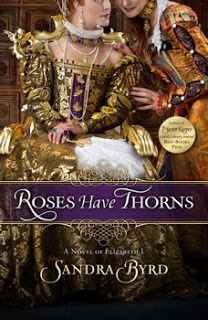
Roses Have Thorns is the third of the Ladies in Waiting Tudor-era novels by Sandra Byrd. It introduces the reader to a Swedish historical woman, Elin von Snakenberg, or as she came to be known in England, Helena, Marchioness of Northampton. Through the story of Elin we come into the court of Elizabeth I where we are brought face to face with the carefully researched ups-and-downs and at times life-and-death intrigues of life for a queen who had grown up with an all too realistic fear for her own neck after her father ordered the beheading of her mother and her wary half-sister took the throne. Surely such a Rose would have dangerous thorns as a cousin entered her land and was said to contend for her throne. Who around her could Elizabeth trust?
Byrd paints a sympathetic and likeable heroine from the start of the book as Elin must leave her fiance behind obviously entangled in a love affair with her sister as Elin travels to England attending a Swedish princess. A difficult, lengthy voyage and Danish interference cut off communication with her family. Love quickly finds her in England, however, with Lord Northampton, brother of the late Queen Kathryn Parr, and she comes to be the second most powerful woman in the land. Yet we see how Elin endured puzzling rejection and even near death for having brought along into Elizabeth's bedchamber a custom from her homeland.
Lovers of historical fiction will enjoy becoming better acquainted with numerous persons--the Swedish princess, many from Elizabeth's court and especially the not-well-known Elin from Sweden. Byrd won a fascinated readership with this choice of a lovely, young woman who would enchant an uneasy queen with her soothing massage and her discerning words spoken with a lilting accent.
Writing in the first person, Byrd conjures interesting phrases that make reading her fiction a word-lover's delight while raising the level of suspense. "She took my proffered arm, but I felt warned rather than warmed."
The author mentions places, customs and persons of the time without giving the story a textbook feel and without taking the reader out of the story. I was far too intrigued with what might happen next to go looking things up (except for the delightful main character!), yet I grew in knowledge of the period and felt ever more dressed in a Tudor gown.
An appealing cover shows Elizabeth and her lady in cloth of gold, and the family trees of main characters assist the reader in placing them accurately in context. Chapter numbers are underscored with scrollwork befitting the historical setting, and a description of dates and locations for each chapter help the reader remain grounded. Bestselling authors and respected literary journalists fill pages with praise for the book.
~~~~~~~~~~~~~
Roses Have Thorns is available at Amazon. The publisher is offering to send a copy to one winner. You may enter the drawing by commenting below. Please be sure to leave your contact information. A winner will be chosen by random drawing and announced here by May 29th, 2013.
Roses Have Thorns is published by Howard Books, a division of Simon and Schuster, Inc.
Copyright 2013 by Sandra Byrd
ISBN 978-1-4391-8316-8
ISBN 978-1-4391-8318-2 (ebook)
~~~~~~~~~~~~~
About the author

After earning her first rejection at the age of thirteen, bestselling author Sandra Byrd has now published more than forty books. Her adult fiction debut, Let Them Eat Cake, was a Christy Award finalist, as was her first historical novel, To Die For: A Novel of Anne Boleyn. To Die For was also named by Library Journal as a Best Books Pick for 2011 and The Secret Keeper: A Novel of Kateryn Parr, was named a Library Journal Best Books Pick for 2012. Roses Have Thorns: A Novel of Elizabeth I, will publish in April, 2013.
Sandra has also published dozens of books for tweens and teens.
A former textbook acquisitions editor, Sandra has also published many nonfiction articles and books. She is also passionate about helping new writers develop their talent and their work toward traditional or self publication. As such, she has mentored and coached hundreds of new writers and continues to coach dozens to success each year.
Please visit www.sandrabyrd.com to learn more, or to invite Sandra to your bookclub via Skype.
Connect with Sandra on Twitter: www.twitter.com/sandrabyrd
Connect on Facebook: https://www.facebook.com/sandrabyrdwrites
Thank you for reading my blog! I am always eager to hear back from you.
Debbie Brown
Author of The Companion of Lady Holmeshire
Published on May 13, 2013 22:29
May 8, 2013
Historical Fiction Enticements 5/8
AUTUMN DUCHESS: A Georgian Historical RomanceRoxton Series Book 3
(Follows on from Noble Satyr and Midnight Marriage)
Lucinda Brant
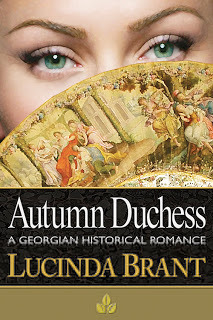
A beautiful duchess mourns for her beloved.
A sun-bronzed merchant returns to claim a birthright.
Disparate souls in need of love and renewal.
Paths cross and the journey begins...
Set in Hampshire, England, 1777. Antonia, Dowager Duchess of Roxton emerges from utter despair after the death of her husband and soul mate to unexpectedly find love again.
5 stars Readers’ Favorite Book Award Finalist
5 stars Night Owl Reviews Top Pick
All Time Keeper Shelf 5 stars Crowned Heart InD’Tale Magazine
Webpage to all buy sites
Amazon US
Amazon UK
~~~~~~~~~~~~~
Lenin's Harem
William Burton McCormick
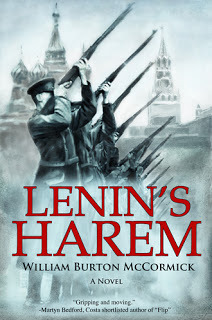
One night in the Russian imperial province of Courland, an eleven-year-old boy more than a little drunk on his parents’ champagne slips away from his aristocratic manor and heads for the village that houses his family’s Latvian farmhands. It is Christmas 1905, two months after Emperor Nicholas II of Russia’s October Manifesto has turned his autocracy into the semblance of a constitutional monarchy, and the subject peoples of his empire are restive. In Courland, a province governed by Baltic barons who descend from the thirteenth-century chivalric orders of the Teutonic and Livonian Knights, that hope for change centers on the populace’s desire for independence from its German overlords—even more than from the Russian Empire itself.
Thus begins the story of Wiktor Rooks, a Baltic German boy who soon sees his family’s estate burned, its ancestral property lost, and his own future compromised. Wiktor yearns for the academic life, but family tradition requires him, as a second son, to become a soldier. He joins the Russian imperial army, which assigns him to spy on a unit full of Latvian soldiers fighting to rid themselves of men like him. Slowly he wins their trust, and the friendships he forms there—and the wartime atrocities he witnesses—send him into the ranks of the Latvian Red Riflemen, AKA "Lenin's Harem." By 1918, he is guarding the new Soviet government.
When Latvia achieves its independence in 1920, Wiktor’s fortunes change again, and he returns to the land of his birth. There he strives, once and for all, to overcome his past as the second son of a Baltic baron. But soon the forces of Hitler’s Germany and Stalin’s Russia are massing, and tiny Latvia stands smack in their way.
Amazon US
Amazon UK
~~~~~~~~~~~~~
The Folly at Falconbridge Hall
Maggi Andersen

1894 Vanessa Ashley felt herself qualified for a position as governess, until offered the position at Falconbridge Hall.
Left penniless after the deaths of her artist father and suffragette mother, Vanessa Ashley draws on her knowledge of art, politics, and history to gain employment as a governess. She discovers that Julian, Lord Falconbridge, requires a governess for his ten-year-old daughter Blyth at Falconbridge Hall, in the countryside outside London.
Lord Falconbridge is a scientist and dedicated lepidopterist who is about to embark on an extended expedition to the Amazon. An enigmatic man, he takes a keen interest in his daughter's education. As she prepares her young charge, Vanessa finds the girl detached and aloof.
As Vanessa learns more about Falconbridge Hall, more questions arise. Why doesn't Blythe feel safe in her own home? Why is the death of her mother, once famed society beauty Clara, never spoken of? And why did the former governess leave so suddenly without giving notice?
Amazon US Amazon UKBarnes and NobleBook Depository
~~~~~~~~~~~~~
The Sign of the Eagle
Jess Steven Hughes
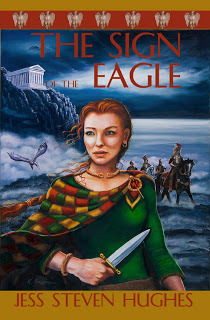
The Sign of the Eagle, a breathtaking historical novel of action and suspense set in the year 71 A.D. amid the exotic and vibrant streets of Ancient Rome. Macha, the strong-willed daughter of a legendary Celtic British king and wife of the Roman tribune, the heroic but reckless, Titus, is the only one who can prove her husband innocent of treason, solve the murders of two slaves who possessed information that could have exonerated Titus, and ultimately save the life of the Roman Emperor Vespasian.
Vivacious and iron-willed, Macha undertakes a dangerous journey and fight for her life to evade assassins through the city's treacherous back alleys, notorious bath houses, and the awe-inspiring palaces of the Roman elite.
With time running out to save her husband and the emperor from certain death, Macha can count on only two allies, the esteemed Senator Bassus─a family friend─and her faithful slave, a resolute and clever Moorish woman, Shafer.
Arrayed against Macha and Titus are the wealthy and wicked Pollia, once scorned as a bride by Titus; unnamed co-conspirators from the army and nobility; and Falco, a military tribune and womanizer, who offers to be Macha's protector once Titus is condemned and executed.
Macha discovers that one of her friends, a Vestal Virgin, Antonia, knows where a list of conspirators, who are planning to murder the emperor, can be found. When urged by Macha to reveal the location, she refuses to divulge its whereabouts. She has a dark secret past that not only leaves her open to blackmail and death, but that of Macha's patron, Senator Bassus as well. This is one of many blind alleys and roadblocks that Macha encounters in her efforts to clear Titus's name.
Macha is devastated when her eight year-old son is kidnapped in an attempt to block her efforts to free Titus, with the threat of his death. What will she do now?
Join Macha in her quest to exonerate her husband...and the discovery of the real threat against the Emperor.
Purchase
Amazon US
Amazon UK
~~~~~~~~~~~~~
Oleanna
Julie K. Rose

Set during the separation of Norway from Sweden in 1905, this richly detailed novel of love and loss was inspired by the life of the author's ancestors.
Oleanna and her sister Elisabeth are the last of their family working their farm deep in Norway's western fjordland, after their beloved brother moves to America and leaves them behind. A new century has begun, and the world outside is changing, but in the Sunnfjord their world is as small and secluded as the verdant banks of a high mountain lake.
The arrival of Anders, a cotter living just across the farm's border, unsettles Oleanna's peaceful but isolated existence. Sharing a common bond of loneliness and grief, Anders stirs within her the wildness and wanderlust she has worked so hard to tame. When she is confronted with another crippling loss, Oleanna must decide once and for all how to face her past, claim her future, and find her place in a wide new world.
"There's elegant restraint in how Rose articulates love and loss, passion and madness, the rhythm of farm life, the quietude of rural Norway. In this book, I saw shades of both Sigrid Undset and Willa Cather." (Unabridged Chick; Top 10 of 2012 pick)
"This is a novel of quiet depth that evokes strong imagery; it is a story that is stark and humble and at the same time, finely drawn. The awe-inspiring scenery, the backbreaking work, and, at the same time, the appeal of and sense of belonging the women feel for their home are brightly painted through the author’s judicious use of language. A beautiful story." (Historical Novels Review)
"This novel paints such a vivid picture of life at this time in history and you feel drawn in from the very first page. You feel the hardships, love, loss, loyalty and family that flow from the pages of this book all the while feeling haunted by the shadows of ghosts past. I don’t often turn the last page of a book and want to go right back to the beginning but that’s how this novel has made me feel with all the beautiful passages and the quiet but deep and touching tale." (Peeking Between the Pages)
Purchase
Amazon US
Amazon UK
Come back next Wednesday for five more synopsis. You may find your favorite-ever book! Thank you for reading my blog! I am always eager to hear back from you.
Debbie Brown
Author of The Companion of Lady Holmeshire
(Follows on from Noble Satyr and Midnight Marriage)
Lucinda Brant

A beautiful duchess mourns for her beloved.
A sun-bronzed merchant returns to claim a birthright.
Disparate souls in need of love and renewal.
Paths cross and the journey begins...
Set in Hampshire, England, 1777. Antonia, Dowager Duchess of Roxton emerges from utter despair after the death of her husband and soul mate to unexpectedly find love again.
5 stars Readers’ Favorite Book Award Finalist
5 stars Night Owl Reviews Top Pick
All Time Keeper Shelf 5 stars Crowned Heart InD’Tale Magazine
Webpage to all buy sites
Amazon US
Amazon UK
~~~~~~~~~~~~~
Lenin's Harem
William Burton McCormick

One night in the Russian imperial province of Courland, an eleven-year-old boy more than a little drunk on his parents’ champagne slips away from his aristocratic manor and heads for the village that houses his family’s Latvian farmhands. It is Christmas 1905, two months after Emperor Nicholas II of Russia’s October Manifesto has turned his autocracy into the semblance of a constitutional monarchy, and the subject peoples of his empire are restive. In Courland, a province governed by Baltic barons who descend from the thirteenth-century chivalric orders of the Teutonic and Livonian Knights, that hope for change centers on the populace’s desire for independence from its German overlords—even more than from the Russian Empire itself.
Thus begins the story of Wiktor Rooks, a Baltic German boy who soon sees his family’s estate burned, its ancestral property lost, and his own future compromised. Wiktor yearns for the academic life, but family tradition requires him, as a second son, to become a soldier. He joins the Russian imperial army, which assigns him to spy on a unit full of Latvian soldiers fighting to rid themselves of men like him. Slowly he wins their trust, and the friendships he forms there—and the wartime atrocities he witnesses—send him into the ranks of the Latvian Red Riflemen, AKA "Lenin's Harem." By 1918, he is guarding the new Soviet government.
When Latvia achieves its independence in 1920, Wiktor’s fortunes change again, and he returns to the land of his birth. There he strives, once and for all, to overcome his past as the second son of a Baltic baron. But soon the forces of Hitler’s Germany and Stalin’s Russia are massing, and tiny Latvia stands smack in their way.
Amazon US
Amazon UK
~~~~~~~~~~~~~
The Folly at Falconbridge Hall
Maggi Andersen

1894 Vanessa Ashley felt herself qualified for a position as governess, until offered the position at Falconbridge Hall.
Left penniless after the deaths of her artist father and suffragette mother, Vanessa Ashley draws on her knowledge of art, politics, and history to gain employment as a governess. She discovers that Julian, Lord Falconbridge, requires a governess for his ten-year-old daughter Blyth at Falconbridge Hall, in the countryside outside London.
Lord Falconbridge is a scientist and dedicated lepidopterist who is about to embark on an extended expedition to the Amazon. An enigmatic man, he takes a keen interest in his daughter's education. As she prepares her young charge, Vanessa finds the girl detached and aloof.
As Vanessa learns more about Falconbridge Hall, more questions arise. Why doesn't Blythe feel safe in her own home? Why is the death of her mother, once famed society beauty Clara, never spoken of? And why did the former governess leave so suddenly without giving notice?
Amazon US Amazon UKBarnes and NobleBook Depository
~~~~~~~~~~~~~
The Sign of the Eagle
Jess Steven Hughes

The Sign of the Eagle, a breathtaking historical novel of action and suspense set in the year 71 A.D. amid the exotic and vibrant streets of Ancient Rome. Macha, the strong-willed daughter of a legendary Celtic British king and wife of the Roman tribune, the heroic but reckless, Titus, is the only one who can prove her husband innocent of treason, solve the murders of two slaves who possessed information that could have exonerated Titus, and ultimately save the life of the Roman Emperor Vespasian.
Vivacious and iron-willed, Macha undertakes a dangerous journey and fight for her life to evade assassins through the city's treacherous back alleys, notorious bath houses, and the awe-inspiring palaces of the Roman elite.
With time running out to save her husband and the emperor from certain death, Macha can count on only two allies, the esteemed Senator Bassus─a family friend─and her faithful slave, a resolute and clever Moorish woman, Shafer.
Arrayed against Macha and Titus are the wealthy and wicked Pollia, once scorned as a bride by Titus; unnamed co-conspirators from the army and nobility; and Falco, a military tribune and womanizer, who offers to be Macha's protector once Titus is condemned and executed.
Macha discovers that one of her friends, a Vestal Virgin, Antonia, knows where a list of conspirators, who are planning to murder the emperor, can be found. When urged by Macha to reveal the location, she refuses to divulge its whereabouts. She has a dark secret past that not only leaves her open to blackmail and death, but that of Macha's patron, Senator Bassus as well. This is one of many blind alleys and roadblocks that Macha encounters in her efforts to clear Titus's name.
Macha is devastated when her eight year-old son is kidnapped in an attempt to block her efforts to free Titus, with the threat of his death. What will she do now?
Join Macha in her quest to exonerate her husband...and the discovery of the real threat against the Emperor.
Purchase
Amazon US
Amazon UK
~~~~~~~~~~~~~
Oleanna
Julie K. Rose

Set during the separation of Norway from Sweden in 1905, this richly detailed novel of love and loss was inspired by the life of the author's ancestors.
Oleanna and her sister Elisabeth are the last of their family working their farm deep in Norway's western fjordland, after their beloved brother moves to America and leaves them behind. A new century has begun, and the world outside is changing, but in the Sunnfjord their world is as small and secluded as the verdant banks of a high mountain lake.
The arrival of Anders, a cotter living just across the farm's border, unsettles Oleanna's peaceful but isolated existence. Sharing a common bond of loneliness and grief, Anders stirs within her the wildness and wanderlust she has worked so hard to tame. When she is confronted with another crippling loss, Oleanna must decide once and for all how to face her past, claim her future, and find her place in a wide new world.
"There's elegant restraint in how Rose articulates love and loss, passion and madness, the rhythm of farm life, the quietude of rural Norway. In this book, I saw shades of both Sigrid Undset and Willa Cather." (Unabridged Chick; Top 10 of 2012 pick)
"This is a novel of quiet depth that evokes strong imagery; it is a story that is stark and humble and at the same time, finely drawn. The awe-inspiring scenery, the backbreaking work, and, at the same time, the appeal of and sense of belonging the women feel for their home are brightly painted through the author’s judicious use of language. A beautiful story." (Historical Novels Review)
"This novel paints such a vivid picture of life at this time in history and you feel drawn in from the very first page. You feel the hardships, love, loss, loyalty and family that flow from the pages of this book all the while feeling haunted by the shadows of ghosts past. I don’t often turn the last page of a book and want to go right back to the beginning but that’s how this novel has made me feel with all the beautiful passages and the quiet but deep and touching tale." (Peeking Between the Pages)
Purchase
Amazon US
Amazon UK
Come back next Wednesday for five more synopsis. You may find your favorite-ever book! Thank you for reading my blog! I am always eager to hear back from you.
Debbie Brown
Author of The Companion of Lady Holmeshire
Published on May 08, 2013 00:00
May 1, 2013
Historical Fiction Enticements 5/1
Wednesdays, life permitting, I will be hosting a variety of historical fiction book synopsis. I hope to introduce you histfic lovers to many authors and their novels from a variety of areas and eras. ~~~~~~~~~~~~~
SALT REDUX: Sequel to Salt Bride
Lucinda Brant
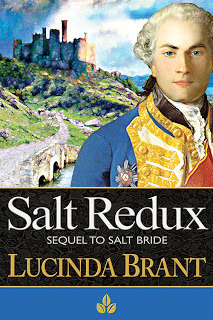
Jane and Salt—four years of Happily Ever After
Sir Antony Templestowe—four years of Exile
Lady Caroline—four years of Heartache
Diana St. John—four years plotting Revenge
The time has come... How does a brother cope with life knowing his sister is a murderess? How can a nobleman have the life he has always wanted when a lurking evil consumes his thoughts and haunts his dreams? What will it take for good to triumph over evil?
For readers who enjoyed Salt Bride: A Georgian Historical Romance, the story continues…
5 stars from Readers' Favorite and a Night Owl Reviews 5 star Top Pick
All buy Links
Amazon UK
Amazon US
~~~~~~~~~~~~~
Of Honest Fame
M.M. Bennetts
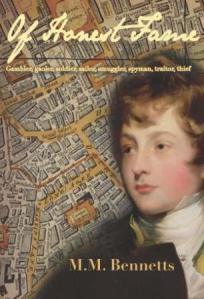
Gambler, gaoler, soldier, sailor, smuggler, spyman, traitor, thiefA battle of wits against the brutal forces of Napoleon’s tyranny over Europe
On a summer night in 1812, a boy sets fire to a house in Paris before escaping over the rooftops. Carrying vital intelligence about Napoleon’s Russian campaign, he heads for England. But landing in Kent, he is beaten almost to death.
The Foreign Secretary, Lord Castlereagh, is desperate for the boy’s information. He is even more desperate, however, to track down the boy’s assailant – a sadistic French agent who knows far too much about Castlereagh’s intelligence network.
Captain George Shuster is a veteran of the Peninsula, an aide-de-camp to Wellington, now recalled from the continent and struggling to adjust to civilian life. Thomas Jesuadon is a dissolute, living on the fringes of society, but with an unrivalled knowledge of the seamy underside of the capital. Setting out to trace the boy’s attacker, they journey from the slums of London to the Scottish coast, following a trail of havoc, betrayal, official incompetence and murder. It takes an unlikely encounter with a frightened young woman to give them the breakthrough that will turn the hunter into the hunted.
Meanwhile, the boy travels the breadth of Europe in the wake of the Grande Armée, witnessing at first hand the ruination they leave behind and the awful price of Napoleon’s ambition.
This companion to M.M. Bennetts’s brilliant debut, is a gripping account of deception, daring and determination, of intelligence and guile pitted against brutality. Bennetts brings to vivid life the harrowing devastation wrought on the civilian populations of Europe by Napoleon’s men, and the grit, courage and tenacity of those who stood against them.
Amazon US
Amazon UK
~~~~~~~~~~~~~
THE END OF THE WORLDDavid William Wilkin
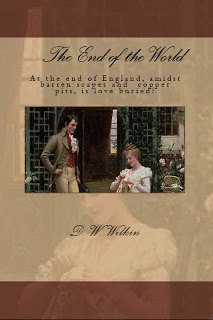
Hermione knew that there were not many opportunities for a great marriage when one lived exclusively in the country. In Cornwall near the mines.
Even when the daughter of a Baronet, if you didn't go to Town, the chances to make a noteworthy match was difficult, if one were to choose a word to describe it.
Yet, Hermione was content. She admired her father, Sir Lawrence, greatly, and even should she make a match that was not of the first, second, or even the third circle of the Ton, but one that would allow her to stay in Scorrier or Redruth near her father, she would be happy.
Yes, there were troubles. Aside from the war with the Tyrant that waged, the upstart Tadcaster's, led by a patriarch who once had worked as but a miner for Sir Lawrence seemed to threaten the Merwyn's with ruin nearly on a daily basis. The income from Sir Lawrence's holdings also diminished, and Hermione's younger step-sister campaigned for a season in London even should it mean the ruination of their father's pocketbook.
Yet Cornwall was far from the troubles of the kingdom and the world. Hermione was sure that she could find a simple life here in the barrenness of the county. That was, she thought so until Samuel Lynchhammer arrived. A man whose past was obscured, mysterious would be too cliche. A man who instantly took to the labour of aiding her father to right his fortunes and thwart the Tadcaster's. A man who might disrupt all her careful, quiet plans.
Amazon US
Amazon UK
~~~~~~~~~~~~~
Silent Trauma
Judith Barrow

MEG MATTHEWS’ daughter, LISA is diagnosed with a cancer of the cervix, at the age of eighteen. Not able to face having a hysterectomy she commits suicide.
When pregnant with Lisa, Meg was prescribed the drug Stilboestrol by her doctor, as were thousands of women in the mid twentieth century in the belief that it prevented miscarriages, It didn’t. But it did cause both the cancer and internal abnormalities in the reproductive structures of the daughters.
Meg spends years trying to expose the drug. Then she tells Lisa's story to the local radio station.
Having suffered a fourth miscarriage, RACHEL CONWAY hears the interview and contacts Meg. Exposed to the drug in utero she despairs of having children. She confides in her friend, JACKIE DUFFY, who is shocked. She also has been affected by Stilboestrol having had endometriosis since puberty. She has never told anyone.
Jackie has a destructive relationship with her mother, MARY, who refuses to accept that the drug caused the problems. Her rejection of Jackie stems from guilt and her homophobic revulsion of Jackie's relationship with HAZEL, an older possessive woman.
Rachel discovers that her husband STEPHEN is having an affair and his lover gives birth to a son. Two months after he leaves her she realises she is pregnant again. This time she carries the child, a girl, to term.
Like Meg's daughter, Lisa, AVRIL BREEN, a writer, developed cancer in her late teens. She underwent a hysterectomy and vaginectomy after which her fiancé called off their wedding. Unwilling to form another close relationship Avril isolated herself in a cottage in the Pennines. She hears about Meg's interview through relatives in Wales and contacts her, consequently becoming friends with Rachel and Jackie.
Each woman's story interacts throughout the novel and is underlined by the main theme of the drug.As the friendships grow we follow the women's lives and their determination to make public the devastating results of the drug. Avril persuades them to collaborate in writing a play about it.
The story ends as the curtain rises.
Their stories are fiction - the drug real.
Amazon US
Amazon UK
Thank you for reading my blog! I am always eager to hear back from you.
Debbie Brown
Author of The Companion of Lady Holmeshire
SALT REDUX: Sequel to Salt Bride
Lucinda Brant

Jane and Salt—four years of Happily Ever After
Sir Antony Templestowe—four years of Exile
Lady Caroline—four years of Heartache
Diana St. John—four years plotting Revenge
The time has come... How does a brother cope with life knowing his sister is a murderess? How can a nobleman have the life he has always wanted when a lurking evil consumes his thoughts and haunts his dreams? What will it take for good to triumph over evil?
For readers who enjoyed Salt Bride: A Georgian Historical Romance, the story continues…
5 stars from Readers' Favorite and a Night Owl Reviews 5 star Top Pick
All buy Links
Amazon UK
Amazon US
~~~~~~~~~~~~~
Of Honest Fame
M.M. Bennetts

Gambler, gaoler, soldier, sailor, smuggler, spyman, traitor, thiefA battle of wits against the brutal forces of Napoleon’s tyranny over Europe
On a summer night in 1812, a boy sets fire to a house in Paris before escaping over the rooftops. Carrying vital intelligence about Napoleon’s Russian campaign, he heads for England. But landing in Kent, he is beaten almost to death.
The Foreign Secretary, Lord Castlereagh, is desperate for the boy’s information. He is even more desperate, however, to track down the boy’s assailant – a sadistic French agent who knows far too much about Castlereagh’s intelligence network.
Captain George Shuster is a veteran of the Peninsula, an aide-de-camp to Wellington, now recalled from the continent and struggling to adjust to civilian life. Thomas Jesuadon is a dissolute, living on the fringes of society, but with an unrivalled knowledge of the seamy underside of the capital. Setting out to trace the boy’s attacker, they journey from the slums of London to the Scottish coast, following a trail of havoc, betrayal, official incompetence and murder. It takes an unlikely encounter with a frightened young woman to give them the breakthrough that will turn the hunter into the hunted.
Meanwhile, the boy travels the breadth of Europe in the wake of the Grande Armée, witnessing at first hand the ruination they leave behind and the awful price of Napoleon’s ambition.
This companion to M.M. Bennetts’s brilliant debut, is a gripping account of deception, daring and determination, of intelligence and guile pitted against brutality. Bennetts brings to vivid life the harrowing devastation wrought on the civilian populations of Europe by Napoleon’s men, and the grit, courage and tenacity of those who stood against them.
Amazon US
Amazon UK
~~~~~~~~~~~~~
THE END OF THE WORLDDavid William Wilkin

Hermione knew that there were not many opportunities for a great marriage when one lived exclusively in the country. In Cornwall near the mines.
Even when the daughter of a Baronet, if you didn't go to Town, the chances to make a noteworthy match was difficult, if one were to choose a word to describe it.
Yet, Hermione was content. She admired her father, Sir Lawrence, greatly, and even should she make a match that was not of the first, second, or even the third circle of the Ton, but one that would allow her to stay in Scorrier or Redruth near her father, she would be happy.
Yes, there were troubles. Aside from the war with the Tyrant that waged, the upstart Tadcaster's, led by a patriarch who once had worked as but a miner for Sir Lawrence seemed to threaten the Merwyn's with ruin nearly on a daily basis. The income from Sir Lawrence's holdings also diminished, and Hermione's younger step-sister campaigned for a season in London even should it mean the ruination of their father's pocketbook.
Yet Cornwall was far from the troubles of the kingdom and the world. Hermione was sure that she could find a simple life here in the barrenness of the county. That was, she thought so until Samuel Lynchhammer arrived. A man whose past was obscured, mysterious would be too cliche. A man who instantly took to the labour of aiding her father to right his fortunes and thwart the Tadcaster's. A man who might disrupt all her careful, quiet plans.
Amazon US
Amazon UK
~~~~~~~~~~~~~
Silent Trauma
Judith Barrow

MEG MATTHEWS’ daughter, LISA is diagnosed with a cancer of the cervix, at the age of eighteen. Not able to face having a hysterectomy she commits suicide.
When pregnant with Lisa, Meg was prescribed the drug Stilboestrol by her doctor, as were thousands of women in the mid twentieth century in the belief that it prevented miscarriages, It didn’t. But it did cause both the cancer and internal abnormalities in the reproductive structures of the daughters.
Meg spends years trying to expose the drug. Then she tells Lisa's story to the local radio station.
Having suffered a fourth miscarriage, RACHEL CONWAY hears the interview and contacts Meg. Exposed to the drug in utero she despairs of having children. She confides in her friend, JACKIE DUFFY, who is shocked. She also has been affected by Stilboestrol having had endometriosis since puberty. She has never told anyone.
Jackie has a destructive relationship with her mother, MARY, who refuses to accept that the drug caused the problems. Her rejection of Jackie stems from guilt and her homophobic revulsion of Jackie's relationship with HAZEL, an older possessive woman.
Rachel discovers that her husband STEPHEN is having an affair and his lover gives birth to a son. Two months after he leaves her she realises she is pregnant again. This time she carries the child, a girl, to term.
Like Meg's daughter, Lisa, AVRIL BREEN, a writer, developed cancer in her late teens. She underwent a hysterectomy and vaginectomy after which her fiancé called off their wedding. Unwilling to form another close relationship Avril isolated herself in a cottage in the Pennines. She hears about Meg's interview through relatives in Wales and contacts her, consequently becoming friends with Rachel and Jackie.
Each woman's story interacts throughout the novel and is underlined by the main theme of the drug.As the friendships grow we follow the women's lives and their determination to make public the devastating results of the drug. Avril persuades them to collaborate in writing a play about it.
The story ends as the curtain rises.
Their stories are fiction - the drug real.
Amazon US
Amazon UK
Thank you for reading my blog! I am always eager to hear back from you.
Debbie Brown
Author of The Companion of Lady Holmeshire
Published on May 01, 2013 00:00
April 4, 2013
A Happy Marriage- Though Brief: Charlotte and Leopold
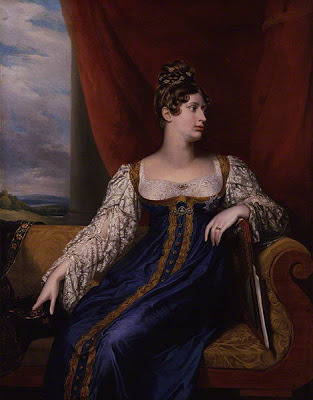 Charlotte of WalesCharlotte of Wales came from a highly dysfunctional family- certainly not one of happily-ever-after romance. Her grandfather, George III, though happily married and the father of fifteen children, had only one legitimate grandchild, Charlotte, for all the years of her life. She was the daughter of his heir, who became Prince Regent and then George IV. Of her paternal aunts, only one was ever allowed to marry. Her paternal uncles had mistresses and illegitimate children. Charlotte grew up second in line to the throne after her father.
Charlotte of WalesCharlotte of Wales came from a highly dysfunctional family- certainly not one of happily-ever-after romance. Her grandfather, George III, though happily married and the father of fifteen children, had only one legitimate grandchild, Charlotte, for all the years of her life. She was the daughter of his heir, who became Prince Regent and then George IV. Of her paternal aunts, only one was ever allowed to marry. Her paternal uncles had mistresses and illegitimate children. Charlotte grew up second in line to the throne after her father. 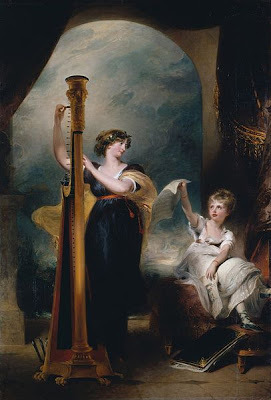 Caroline, Princess of Wales and CharlotteThe prince, of course, had to provide an heir and so married Caroline of Brunswick. When she arrived to meet him, he was immediately disgusted with her and showed up at their wedding drunk. She conceived very soon thereafter, gave birth nine months after the wedding and before long was unwelcome in her husband's life. She was sent off to her own house. Their daughter Charlotte also had her own house with her own household as a child. Charlotte grew up rebellious and without the graces expected of a princess. However, she was highly popular with the people. They loved her. Being the only heir to the throne in her generation, the government was duly concerned that she be married and have children. They suggested she marry William of Orange, and though she did not like him, at her father's urging she agreed. Before long, however, she was interested in the King of Prussia's nephew, Prince Frederick, and spent some time with him. She insisted on breaking her engagement. When her father learned that she was seeing a man, he dismissed her household and secluded her at Windsor Park. Her engagement with William was broken, and Frederick ended their relationship as well. Charlotte had met Leopold when she met Frederick. She now turned her attentions in his direction. Though her father at first rejected him, Leopold was just the man for Charlotte. He was the younger son of a prince, pursued a military career in which he distinguished himself and had considerable diplomatic skills. Best of all, he was able to tame her and create a happy home.
Caroline, Princess of Wales and CharlotteThe prince, of course, had to provide an heir and so married Caroline of Brunswick. When she arrived to meet him, he was immediately disgusted with her and showed up at their wedding drunk. She conceived very soon thereafter, gave birth nine months after the wedding and before long was unwelcome in her husband's life. She was sent off to her own house. Their daughter Charlotte also had her own house with her own household as a child. Charlotte grew up rebellious and without the graces expected of a princess. However, she was highly popular with the people. They loved her. Being the only heir to the throne in her generation, the government was duly concerned that she be married and have children. They suggested she marry William of Orange, and though she did not like him, at her father's urging she agreed. Before long, however, she was interested in the King of Prussia's nephew, Prince Frederick, and spent some time with him. She insisted on breaking her engagement. When her father learned that she was seeing a man, he dismissed her household and secluded her at Windsor Park. Her engagement with William was broken, and Frederick ended their relationship as well. Charlotte had met Leopold when she met Frederick. She now turned her attentions in his direction. Though her father at first rejected him, Leopold was just the man for Charlotte. He was the younger son of a prince, pursued a military career in which he distinguished himself and had considerable diplomatic skills. Best of all, he was able to tame her and create a happy home. 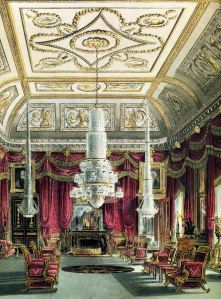 Carlton House, The Crimson State RoomCharlotte and Leopold were married in splendor according to her father's wishes at Carlton House in the Crimson State Room. A temporary altar was set up in the room with a crimson velvet cloth. Other elegant items were brought in. Charlotte dressed in silver lame' with point Brussels lace. Leopold, now a British Fieldmarshal, wore an embroidered uniform. Their happiness was not to last long. Charlotte miscarried a couple of times, and then conceived again. After moving to their country home, Charlotte carried a child who was expected to become her heir. The nation rejoiced. Doctors put her on a strict regimen- blood-letting and severe dieting. By the time she was in labor, Charlotte was greatly weakened, and her son was stillborn. Charlotte died thereafter. England lost two future monarchs in one birth. And now there were none in her generation, and no married family likely to produce an heir. The nation grieved hugely much like they did when Diana, Princess of Wales died. Charlotte's uncles left their mistresses to marry princesses and produce an heir. At last, George III, now deceased, had another granddaughter, Victoria, who became queen for many years.
Carlton House, The Crimson State RoomCharlotte and Leopold were married in splendor according to her father's wishes at Carlton House in the Crimson State Room. A temporary altar was set up in the room with a crimson velvet cloth. Other elegant items were brought in. Charlotte dressed in silver lame' with point Brussels lace. Leopold, now a British Fieldmarshal, wore an embroidered uniform. Their happiness was not to last long. Charlotte miscarried a couple of times, and then conceived again. After moving to their country home, Charlotte carried a child who was expected to become her heir. The nation rejoiced. Doctors put her on a strict regimen- blood-letting and severe dieting. By the time she was in labor, Charlotte was greatly weakened, and her son was stillborn. Charlotte died thereafter. England lost two future monarchs in one birth. And now there were none in her generation, and no married family likely to produce an heir. The nation grieved hugely much like they did when Diana, Princess of Wales died. Charlotte's uncles left their mistresses to marry princesses and produce an heir. At last, George III, now deceased, had another granddaughter, Victoria, who became queen for many years.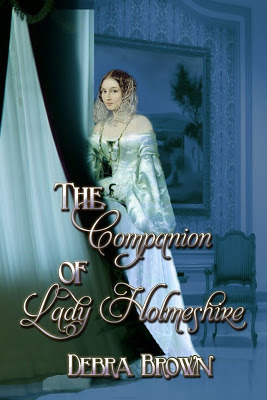 Charlotte and Leopold as well as a fictional uncle of Charlotte are a part of the story The Companion of Lady Holmeshire by Debra Brown.
Charlotte and Leopold as well as a fictional uncle of Charlotte are a part of the story The Companion of Lady Holmeshire by Debra Brown.Amazon
Audible (Free with Audible trial!)
Barnes and Noble
Smashwords
iBookstoreThank you for reading my blog! I am always eager to hear back from you.
Debbie Brown
Author of The Companion of Lady Holmeshire
Published on April 04, 2013 10:18
February 5, 2013
23-Book Giveaway!
Visit The League of British Artists to check out 23 books being given away! http://britsunited.blogspot.com/p/val... Thank you for reading my blog! I am always eager to hear back from you.
Debbie Brown
Author of The Companion of Lady Holmeshire
Debbie Brown
Author of The Companion of Lady Holmeshire
Published on February 05, 2013 09:24
December 20, 2012
Free Audiobook: The Companion of Lady Holmeshire
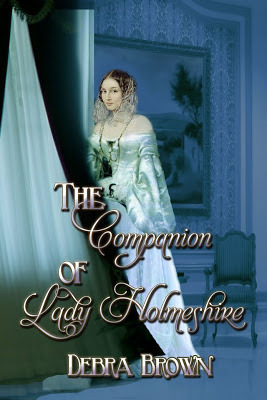 Traveling soon? Commuting? With a free 30-day trial of Audible.com (an Amazon branch) you can get a free audiobook copy of The Companion of Lady Holmeshire. Check it out HERE! Thank you for reading my blog! I am always eager to hear back from you.
Traveling soon? Commuting? With a free 30-day trial of Audible.com (an Amazon branch) you can get a free audiobook copy of The Companion of Lady Holmeshire. Check it out HERE! Thank you for reading my blog! I am always eager to hear back from you.Debbie Brown
Author of The Companion of Lady Holmeshire
Published on December 20, 2012 12:23
August 7, 2012
Interview of HisFic Author Laura Purcell
1) What moved you to become an author?
In my opinion, very few writers get to make a choice; they’re just born that way and can’t be cured! I honestly don’t remember sitting down and thinking “Yes, I’m going to be an author.”
Looking back, my first serious spate of writing began one summer when I was around fifteen. During the school holidays, I read the complete works of Bronte and Austen. I loved those books so much, I felt empty when I’d finished. I started to plug the gap by making up stories of my own.
2) Tell us about your work in progress.
I’m working on a series of books about the Hanoverian monarchs – that’s George I through to William IV – and the amazing women in their lives. My aim when I set out was to become a Philippa Gregory for the Jane Austen era. That’s a pretty high goal!
I’m currently preparing the first of the novels, God Save the King, for publication in September 2012. The story charts the progress of George III’s famed madness, showing how it affected his family. My focus is on his wife, Queen Charlotte, who had to cope with an unstable husband and a large brood of children. She was an incredible person with so much strength.
I also follow Charlotte’s courageous daughters, who were practically entombed in Windsor Castle. All six try to escape, but I concentrate on Royal and Sophia. Royal was a gauche Princess who never quite fitted her role. The world saw Sophia as a reclusive invalid, but rebellion was brewing behind her sick room door…
3) What did you find most challenging about this book?
I had to work hard to represent each character fairly. I was painfully aware that I was writing about real people who had to be treated with respect. It was just as difficult to show the bad parts of the characters I loved as the good parts of those I detested!
Other than that, my main challenge was ruthless self-editing. I was fascinated by George III’s family and a bit in love with each of them. I wanted to include every detail, but I had to make sure I didn’t overburden the reader. I also had to simplify the family dynamics. Some of the Princesses’ many brothers had to be removed from the mix. When your heroine has fifteen children, life starts to get complicated…
5) How did you choose your publishing method?
I think there are pros and cons with both the traditional and self publishing route. I would eventually like to be traditionally published, but unfortunately Georgian history falls into a “niche” area of the market at the moment. There simply aren’t many publishers and agents willing to take books set in a period that hasn’t proved itself as a popular era for historical fiction, such as the Tudors. I have, however, received great help, praise and advice from a number of agents and am very grateful for their input.
6) Tell us a little about yourself?As I’m sure you have guessed, I’m a bit of a history nut. I belong to a Medieval re-enactment group and Tudor dancing society, so you might see me around the country doing a pavane in full costume!
I live in Colchester, Britain’s oldest recorded town, with my husband and nine guinea pigs. Yes, nine. We’re big animal lovers.
I adore reading, obviously. The house is full of bookshelves with all genres stacked up. One day I’d like to have my very own library room.
Oh, and I drink lots of coffee. I mean a lot.
7) What is your next work?
I’m researching and planning A Forbidden Crown, about George IV and his bigamous marriages to Queen Caroline and Maria Fitzherbert. I can’t wait to start writing! They are all vivid characters who survived a turbulent period in English history.
George was the ultimate playboy, but he certainly met his match in his two wives. Maria was a confident, driven woman who knew her worth. She certainly wasn’t going to let George mess her around if she could help it. As for Caroline, she went on to become one of the most notorious – although forgotten – Queens in history. She was a free spirit, wild and mischievous. No wonder George was afraid of her influence rubbing off on their young daughter, Charlotte.
Charlotte herself is one of my favourite historical figures of all time. I hope by the end of A Forbidden Crown, you’ll come to love her as much as I do!
8) Who do you read?
I try to read as many authors as possible, because I feel it helps my artistic development. I like to absorb many voices, finding out what works and what doesn’t. My favourites at the moment are Kate Morton, Philippa Gregory and Sarah Waters. I also like to read classics when I get the chance; anything from Shakespeare to Fitzgerald.
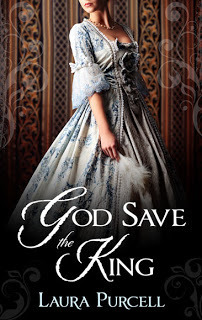
9) Where should we look for your work?
I will keep you regularly updated about the progress of God Save the King on my website, laurapurcell.com. You can also get a sneak peek at the opening of the book here. I hope to publish on 8 September 2012, which is George III and Queen Charlotte’s wedding anniversary. The book will be available through Kindle on Amazon and other select distributors. Watch this space! Thank you for reading my blog! I am always eager to hear back from you.
Debbie Brown
Author of The Companion of Lady Holmeshire
Published on August 07, 2012 16:46
February 11, 2012
How to Ruin a Friendship
by Katherine Ashe
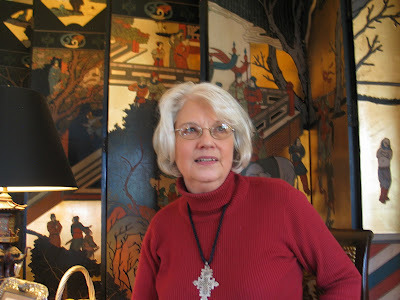
Simon de Montfort and King Henry III
All of God's Creation forms a line of power and greatness, from the hierarchies of heaven, through popes, kings, lords and common mankind, and so on down to the lowliest worm - so said Thomas Aquinas. It was a great relief to kings and the Pope who were seeing the Hand of God favoring the common people and their leader Simon de Montfort. It was indeed a happy thought Aquinas offered, and it prompted the Pope to make heretics of the followers of Montfort and his armies fighting for the common people's right to govern themselves.
That was in 1262. A lot has happened since then. But Aquinas succeeded in halting the rise of democracy for five hundred years, bolstering the power of kings to do as they pleased under a proclaimed Divine Right.
Who was Simon de Montfort, and how did he come to be fighting for democracy so very long before it freely blossomed?

Carcassone, where Simon was born.
Simon was the son of Simon de Montfort the Crusader, then much lauded, now much hated for his campaign against the Albigensian heretics of southern France. Orphaned and bankrupted by his father's wars, young Simon apparently grew up at the Court of Paris, close to the Regent Queen Blanche and her son King Louis IX, who was to be Saint Louis. But Simon's future was not to be in France.
While probably still in his teens, young Montfort went to England to try to gain his family's lapsed English titles, Earl of Leicester and Steward of England. King Henry III befriended him, but for years was coy about granting the titles. While waiting, Simon gained fame as a knight in warfare against the Welsh - and fell in love with the king's sister, who was a nun. Their secret marriage most likely was necessary.
Apparently Henry thought he only need ask the Archbishop of Canterbury to lift Sister Eleanor's vows and all would be well. Not so. The Archbishop flatly refused, and only the Pope could overrule him. Simon went to Rome - and came back with Eleanor's vows lifted, but in debt for the rest of his life. If this sounds like a romance, it is nonetheless actual history.
Debt can be a great dampener to even the most yearned-for honeymoon, and apparently the princess, relieved of her vows of poverty and chastity, had been spending like a tycoon, despite the new debt from Rome. (Romance fades for a moment, and chilling economics peep into the story. Letters from both Eleanor's and Simon's spiritual advisers warn then against shouting at each other - especially in front of the servants.)
 Whatever the reason, research and rationality strongly indicated that, when the King and Queen visited Simon's home at Kenilworth on September 9 through 15th, 1238, the Queen, who had been thought barren, conceived a child. A few weeks later, to account for this pregnancy to her husband and the world, the Queen paid a physician who prescribed a herbal tea and prayers at the tomb of Saint Edward - with pregnancy to be the guaranteed result. And indeed, seven months later, a hearty full-term boy-child was born, to be Edward I, so named for he obviously was the result of Saint Edward's miracle - at least so King Henry and all England believed at the time.
Whatever the reason, research and rationality strongly indicated that, when the King and Queen visited Simon's home at Kenilworth on September 9 through 15th, 1238, the Queen, who had been thought barren, conceived a child. A few weeks later, to account for this pregnancy to her husband and the world, the Queen paid a physician who prescribed a herbal tea and prayers at the tomb of Saint Edward - with pregnancy to be the guaranteed result. And indeed, seven months later, a hearty full-term boy-child was born, to be Edward I, so named for he obviously was the result of Saint Edward's miracle - at least so King Henry and all England believed at the time.
Simon was King Henry's closest friend at this time -- until Henry seems to have been disabused of his faith in the saint's responsibility for the birth. The occasion was the Churching of the Queen, an event held to welcome the Queen back into the Church after the lying-in and birth. The ceremony was preceded by the Queen's first confession since her pregnancy was known, and she made that confession to the Archbishop of Canterbury - Simon's enemy who had even traveled to Rome to block his marriage to the nun.
The 13th century Chronicler Matthew Paris reports on the Churching with the precision of an eyewitness. Henry nervously paced back and forth across the dais as the Queen trembled at the altar. Simon arrived late with his wife. Seeing him, the King halted the proceedings, shouting, "So, you do dare show your face here, among decent Christians!" Simon fled, but was evicted by the King's bailiffs from the grand mansion Henry had lent him for the summer.
Returning to the church with his wife, infant son and baby nurse, Simon went forward through the parting crowd and knelt, weeping at Henry's feet, begging forgiveness. "Forgive you!" Henry shrieked. "My friend! Always so ready to serve! It seems your serving knows no end! You seduce…"
But Henry desperately needed this heir to curb the maneuverings of those who would overthrow him to put his far more capable brother Richard on the throne. He curbed himself, and accused Simon of seducing his sister the nun and bribing Rome to relieve her of her vows. Old news resolved more than a year past. He added a few more complaints about debts, also already settled, before he collapsed in tears into the waiting arms of the Archbishop of Canterbury.
Simon fled for his life. So began a career that was eventually to make him the people's champion, founder of Parliament and creator of modern democracy. He was hailed as the Angel of the Apocalypse, bringing in the New Millennium that would see the Church, kingship and nations dissolve and a single World Order take form, guided by the common man through the power of the vote.
From his beginnings, no one could have seemed less likely than Simon de Montfort to come to such an end.

Katherine Ashe is the author of :
Montfort The Early Years 12229 to 1243
Montfort the Viceroy 1243 to 1253
Montfort The Revolutionary 1253 to 1260
Montfort The Angel with the Sword 1260 to 1265
Note by Katherine Ashe: Standard histories credit Henry III as the father of Edward I, ignoring the bill for the physician with the magic tea, recorded in the Great Roll of the Pipe for November 1238; the seven month pregnancy, which Henry himself believed was such a miracle that he renovated Saint Edward's tomb in gratitude; and the murderous attitude Henry had thereafter toward Montfort and, periodically, toward Edward. As for Henry's well-recorded accusations at the Churching, they're lightly dismissed by historians as mere madness. No one but myself, it seems, has taken the trouble to investigate the ancient Churching ritual, to find that it was preceded by a long delayed confession, and would, in the case of the Queen, be made to the officiating Archbishop.
Some historians, sensing doubt, claim Edward was clearly a Plantagenet because he had inherited deformities that ran in the Plantagenet line. They are confusing him with his hunch-backed brother Edmund Crouchback, who probably was Henry's son, for Henry went so far as to hock the Crown of England to gain the Crown of Sicily for him. Edward, called Longshanks, was extraordinarily long of limb, like the Montforts.
It was believed by many, in the 13th century, that Edward was Montfort's natural son. If so, then the royal line returned from the Montforts to the Plantagenets with Henry Bolingbroke, who was descended of Edmund Crouchback on his mother's side. The Tudors, however, proudly claimed direct descent from Simon de Montfort through his daughter Eleanor, who was wed to Llewellyn the Last, and whose daughter Katherine, in her marriage to the prince of southern Wales, united north and south under a single Welsh ruling house. Modern scholars don't think Owen Tudor had quite so fine a pedigree, but Henry VIII, on his family tree in Winchester Hall, blazed large the name of Simon de Montfort.
Simon de Montfort: The Early Years is FREE on Amazon Kindle from February 11th through 13th, 2012.
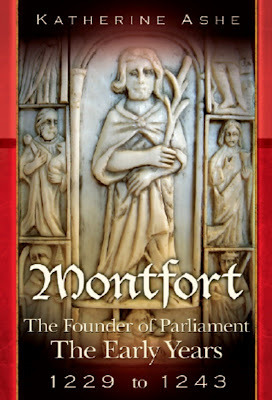 Thank you for reading my blog! I am always eager to hear back from you.
Thank you for reading my blog! I am always eager to hear back from you.
Debbie Brown
Author of The Companion of Lady Holmeshire

Simon de Montfort and King Henry III
All of God's Creation forms a line of power and greatness, from the hierarchies of heaven, through popes, kings, lords and common mankind, and so on down to the lowliest worm - so said Thomas Aquinas. It was a great relief to kings and the Pope who were seeing the Hand of God favoring the common people and their leader Simon de Montfort. It was indeed a happy thought Aquinas offered, and it prompted the Pope to make heretics of the followers of Montfort and his armies fighting for the common people's right to govern themselves.
That was in 1262. A lot has happened since then. But Aquinas succeeded in halting the rise of democracy for five hundred years, bolstering the power of kings to do as they pleased under a proclaimed Divine Right.
Who was Simon de Montfort, and how did he come to be fighting for democracy so very long before it freely blossomed?

Carcassone, where Simon was born.
Simon was the son of Simon de Montfort the Crusader, then much lauded, now much hated for his campaign against the Albigensian heretics of southern France. Orphaned and bankrupted by his father's wars, young Simon apparently grew up at the Court of Paris, close to the Regent Queen Blanche and her son King Louis IX, who was to be Saint Louis. But Simon's future was not to be in France.
While probably still in his teens, young Montfort went to England to try to gain his family's lapsed English titles, Earl of Leicester and Steward of England. King Henry III befriended him, but for years was coy about granting the titles. While waiting, Simon gained fame as a knight in warfare against the Welsh - and fell in love with the king's sister, who was a nun. Their secret marriage most likely was necessary.
Apparently Henry thought he only need ask the Archbishop of Canterbury to lift Sister Eleanor's vows and all would be well. Not so. The Archbishop flatly refused, and only the Pope could overrule him. Simon went to Rome - and came back with Eleanor's vows lifted, but in debt for the rest of his life. If this sounds like a romance, it is nonetheless actual history.
Debt can be a great dampener to even the most yearned-for honeymoon, and apparently the princess, relieved of her vows of poverty and chastity, had been spending like a tycoon, despite the new debt from Rome. (Romance fades for a moment, and chilling economics peep into the story. Letters from both Eleanor's and Simon's spiritual advisers warn then against shouting at each other - especially in front of the servants.)
 Whatever the reason, research and rationality strongly indicated that, when the King and Queen visited Simon's home at Kenilworth on September 9 through 15th, 1238, the Queen, who had been thought barren, conceived a child. A few weeks later, to account for this pregnancy to her husband and the world, the Queen paid a physician who prescribed a herbal tea and prayers at the tomb of Saint Edward - with pregnancy to be the guaranteed result. And indeed, seven months later, a hearty full-term boy-child was born, to be Edward I, so named for he obviously was the result of Saint Edward's miracle - at least so King Henry and all England believed at the time.
Whatever the reason, research and rationality strongly indicated that, when the King and Queen visited Simon's home at Kenilworth on September 9 through 15th, 1238, the Queen, who had been thought barren, conceived a child. A few weeks later, to account for this pregnancy to her husband and the world, the Queen paid a physician who prescribed a herbal tea and prayers at the tomb of Saint Edward - with pregnancy to be the guaranteed result. And indeed, seven months later, a hearty full-term boy-child was born, to be Edward I, so named for he obviously was the result of Saint Edward's miracle - at least so King Henry and all England believed at the time. Simon was King Henry's closest friend at this time -- until Henry seems to have been disabused of his faith in the saint's responsibility for the birth. The occasion was the Churching of the Queen, an event held to welcome the Queen back into the Church after the lying-in and birth. The ceremony was preceded by the Queen's first confession since her pregnancy was known, and she made that confession to the Archbishop of Canterbury - Simon's enemy who had even traveled to Rome to block his marriage to the nun.
The 13th century Chronicler Matthew Paris reports on the Churching with the precision of an eyewitness. Henry nervously paced back and forth across the dais as the Queen trembled at the altar. Simon arrived late with his wife. Seeing him, the King halted the proceedings, shouting, "So, you do dare show your face here, among decent Christians!" Simon fled, but was evicted by the King's bailiffs from the grand mansion Henry had lent him for the summer.
Returning to the church with his wife, infant son and baby nurse, Simon went forward through the parting crowd and knelt, weeping at Henry's feet, begging forgiveness. "Forgive you!" Henry shrieked. "My friend! Always so ready to serve! It seems your serving knows no end! You seduce…"
But Henry desperately needed this heir to curb the maneuverings of those who would overthrow him to put his far more capable brother Richard on the throne. He curbed himself, and accused Simon of seducing his sister the nun and bribing Rome to relieve her of her vows. Old news resolved more than a year past. He added a few more complaints about debts, also already settled, before he collapsed in tears into the waiting arms of the Archbishop of Canterbury.
Simon fled for his life. So began a career that was eventually to make him the people's champion, founder of Parliament and creator of modern democracy. He was hailed as the Angel of the Apocalypse, bringing in the New Millennium that would see the Church, kingship and nations dissolve and a single World Order take form, guided by the common man through the power of the vote.
From his beginnings, no one could have seemed less likely than Simon de Montfort to come to such an end.

Katherine Ashe is the author of :
Montfort The Early Years 12229 to 1243
Montfort the Viceroy 1243 to 1253
Montfort The Revolutionary 1253 to 1260
Montfort The Angel with the Sword 1260 to 1265
Note by Katherine Ashe: Standard histories credit Henry III as the father of Edward I, ignoring the bill for the physician with the magic tea, recorded in the Great Roll of the Pipe for November 1238; the seven month pregnancy, which Henry himself believed was such a miracle that he renovated Saint Edward's tomb in gratitude; and the murderous attitude Henry had thereafter toward Montfort and, periodically, toward Edward. As for Henry's well-recorded accusations at the Churching, they're lightly dismissed by historians as mere madness. No one but myself, it seems, has taken the trouble to investigate the ancient Churching ritual, to find that it was preceded by a long delayed confession, and would, in the case of the Queen, be made to the officiating Archbishop.
Some historians, sensing doubt, claim Edward was clearly a Plantagenet because he had inherited deformities that ran in the Plantagenet line. They are confusing him with his hunch-backed brother Edmund Crouchback, who probably was Henry's son, for Henry went so far as to hock the Crown of England to gain the Crown of Sicily for him. Edward, called Longshanks, was extraordinarily long of limb, like the Montforts.
It was believed by many, in the 13th century, that Edward was Montfort's natural son. If so, then the royal line returned from the Montforts to the Plantagenets with Henry Bolingbroke, who was descended of Edmund Crouchback on his mother's side. The Tudors, however, proudly claimed direct descent from Simon de Montfort through his daughter Eleanor, who was wed to Llewellyn the Last, and whose daughter Katherine, in her marriage to the prince of southern Wales, united north and south under a single Welsh ruling house. Modern scholars don't think Owen Tudor had quite so fine a pedigree, but Henry VIII, on his family tree in Winchester Hall, blazed large the name of Simon de Montfort.
Simon de Montfort: The Early Years is FREE on Amazon Kindle from February 11th through 13th, 2012.
 Thank you for reading my blog! I am always eager to hear back from you.
Thank you for reading my blog! I am always eager to hear back from you.Debbie Brown
Author of The Companion of Lady Holmeshire
Published on February 11, 2012 00:02
January 18, 2012
Award: Most Adorable Historical Trivia Posts Ever
I am endlessly amused at the fun posts put up by Grace Elliot on her blog-with-no-apparent-title. Therefore, I am creating the award Most Adorable Historical Trivia Posts Ever. It is awarded to Grace and had no other contenders.
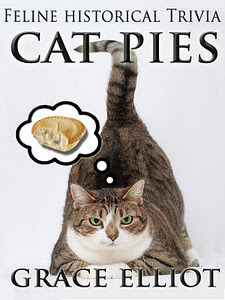 Grace is the author of A Dead Man's Debt, Eulogy's Secret and Cat Pies: Feline Historical Trivia.
Grace is the author of A Dead Man's Debt, Eulogy's Secret and Cat Pies: Feline Historical Trivia.
Purchase Cat Pies
Grace's Nameless BlogThank you for reading my blog! I am always eager to hear back from you.
Debbie Brown
Author of The Companion of Lady Holmeshire
 Grace is the author of A Dead Man's Debt, Eulogy's Secret and Cat Pies: Feline Historical Trivia.
Grace is the author of A Dead Man's Debt, Eulogy's Secret and Cat Pies: Feline Historical Trivia.Purchase Cat Pies
Grace's Nameless BlogThank you for reading my blog! I am always eager to hear back from you.
Debbie Brown
Author of The Companion of Lady Holmeshire
Published on January 18, 2012 09:34



